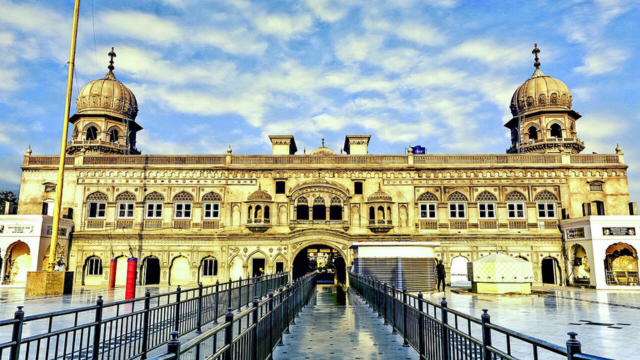Sikhs were prepared to welcome Hindus to their pilgrimage. Pakistan’s government was not.
by A. Sahara Alexander

In a deeply troubling episode that has sparked outrage across India and beyond, Pakistan denied entry to Hindu pilgrims who sought to honor Guru Nanak Dev Ji during the 556th birth anniversary celebrations at Nankana Sahib, his birthplace. While thousands of Sikh devotees were welcomed with garlands and hospitality, at least 14 Hindu devotees were turned away at the Wagah border—despite having valid visas obtained through the Delhi Sikh Gurdwara Management Committee (DSGMC) and being part of the officially sanctioned Sikh jatha.
Guru Nanak Dev Ji, the founder of Sikhism, is revered not only by Sikhs but also by Hindus who embrace his teachings of equality, compassion, and spiritual unity. Yet, Pakistani immigration officials reportedly told Hindu pilgrims, “You are Hindu… Go to your temples instead of Sikh gurdwaras,” denying them access to sacred sites.
These pilgrims, many of whom were born in Pakistan and later became Indian citizens, had joined the Sikh jatha in good faith. Their rejection was not based on security concerns or documentation issues—it was purely a matter of religious discrimination. Amar Chand, a Delhi resident traveling with six family members, recounted how they were removed from the bus after paying $1,073 in Pakistani currency for travel, with no refund offered.
This incident is a deliberate affront to interfaith harmony. Hindu and Sikh communities have long shared cultural and spiritual ties, especially in Punjab, where Guru Nanak’s teachings transcend religious boundaries. Denying Hindus the right to participate in a celebration of a figure they deeply revere is not only unjust—it is a betrayal of Guru Nanak’s inclusive philosophy.

The BJP and other Indian leaders have condemned Pakistan’s actions as a direct assault on Sikh–Hindu unity, accusing Islamabad of attempting to sow discord between communities.
India’s Ministry of External Affairs has reportedly taken serious note of the incident and plans to raise the issue through diplomatic channels.
But this must go beyond formal protest. The international community should hold Pakistan accountable for violating religious freedom and human dignity.
Guru Nanak’s legacy belongs to all who seek truth and compassion. To weaponize religion as a tool of exclusion is to dishonor his memory. The tears of the pilgrims sent back from the border are a stark reminder that religious freedom must be defended against devious political maneuvers.

Uses a pseudonym for security reasons.



